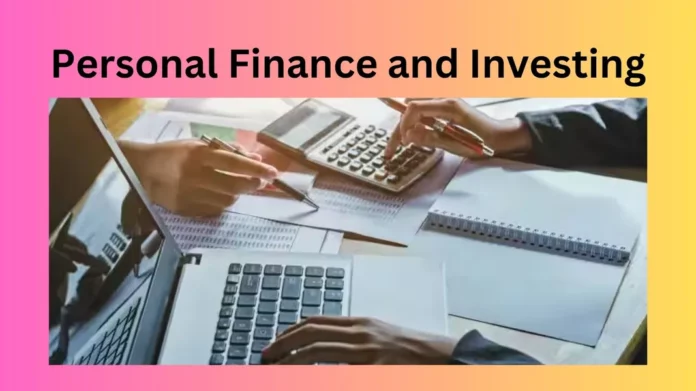Welcome to the world of personal finance and investing! In this comprehensive guide, we’ll delve into the essential principles and strategies to help you navigate the intricate landscape of managing your money, building wealth, and securing your financial future. Whether you’re just starting your journey or looking to fine-tune your financial plan, this article will provide valuable insights and actionable tips to empower you on your path to financial freedom.
Understanding the Basics of Personal Finance
Budgeting: The Foundation of Financial Success
Budgeting is the cornerstone of personal finance. It involves tracking your income and expenses to ensure that you’re living within your means and allocating funds effectively. Start by creating a monthly budget that outlines your income sources, fixed expenses (such as rent/mortgage, utilities, and insurance), and variable expenses (like groceries, entertainment, and transportation). By establishing a budget, you’ll gain better control over your finances and identify areas where you can save or cut back.
Managing Debt: Strategies for Debt Elimination
Debt can be a significant obstacle to financial freedom, but with the right approach, you can overcome it. Start by prioritizing high-interest debts, such as credit card balances, and develop a repayment plan that fits your budget. Consider strategies like the debt snowball method (paying off debts from smallest to largest) or the debt avalanche method (tackling debts with the highest interest rates first). Additionally, explore options for consolidating or refinancing your debt to lower your interest rates and streamline your payments.
Investing for the Future
The Power of Compound Interest
Compound interest is a magical force that can turbocharge your wealth over time. It’s the concept of earning interest on your initial investment as well as on the interest it generates. By starting early and allowing your investments to compound over the long term, you can harness the power of compounding to build substantial wealth. Whether you’re investing in stocks, bonds, mutual funds, or real estate, the key is to remain patient and consistent in your approach.
Diversification: Spreading Your Risk
Diversification is a fundamental strategy for reducing risk in your investment portfolio. Instead of putting all your eggs in one basket, spread your investments across different asset classes, industries, and geographic regions. By diversifying, you can minimize the impact of market fluctuations and potentially enhance your overall returns. Remember to regularly review and rebalance your portfolio to maintain your desired asset allocation and risk tolerance.
Smart Strategies for Financial Success
Setting Financial Goals: The Roadmap to Success
Setting clear, achievable financial goals is essential for staying focused and motivated on your journey to financial success. Whether it’s saving for retirement, buying a home, or traveling the world, articulate your goals and break them down into actionable steps. Consider using the SMART criteria (specific, measurable, achievable, relevant, and time-bound) to ensure that your goals are well-defined and attainable. Regularly revisit and revise your goals as your circumstances change.
Building an Emergency Fund: Financial Safety Net
An emergency fund is your safety net against unexpected expenses or income disruptions. Aim to save three to six months’ worth of living expenses in a liquid, accessible account, such as a high-yield savings account or a money market fund. This fund will provide peace of mind knowing that you have the financial cushion to handle emergencies without derailing your long-term goals.
Conclusion:
Congratulations on taking the first step towards mastering personal finance and investing! By implementing the strategies outlined in this guide, you’ll be well-equipped to take control of your finances, build wealth, and achieve financial freedom. Remember, financial success is a journey, not a destination. Stay disciplined, stay informed, and stay focused on your goals, and you’ll reap the rewards for years to come.
FAQs:
How much money do I need to start investing?
It’s possible to start investing with as little as $100 or even less, thanks to fractional shares and micro-investment platforms. Focus on building a solid foundation of savings and then gradually allocate a portion of your funds to investments that align with your goals and risk tolerance.
Is it better to pay off debt or invest?
The answer depends on your individual circumstances and financial goals. Generally, it’s wise to prioritize high-interest debt repayment to minimize interest costs and improve your financial health. Once your high-interest debts are under control, you can shift your focus towards investing for the future.
How often should I review my investment portfolio?
It’s recommended to review your investment portfolio at least annually, or whenever there are significant life changes or market events. Regularly reassess your asset allocation, risk tolerance, and investment objectives to ensure that your portfolio remains aligned with your financial goals.
What are some tax-efficient investment strategies?
Tax-efficient investment strategies aim to minimize the impact of taxes on your investment returns. Examples include investing in tax-advantaged accounts such as 401(k)s, IRAs, and Health Savings Accounts (HSAs), utilizing tax-loss harvesting to offset capital gains, and prioritizing investments with favorable tax treatment, such as qualified dividends and long-term capital gains.
How can I protect my investments during market downturns?
Market downturns are an inevitable part of investing, but there are strategies you can employ to mitigate their impact. Maintain a diversified portfolio, stay invested for the long term, avoid emotional reactions to short-term market fluctuations, and consider dollar-cost averaging to smooth out market volatility. Additionally, having an adequate emergency fund can provide peace of mind during turbulent times.















